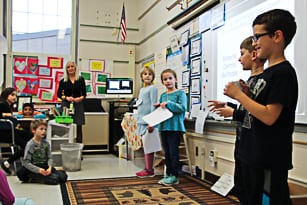SLINGERLANDS — Students from Patricia Paradis’ third-grade class at Slingerlands Elementary School will travel to Rensselaer Polytechnic Institute on Thursday, Dec. 8, to compete against teams from Albany, Troy and Schodack in a Shark Tank-like competition where they will pitch product inventions developed over the last six weeks.
The competition, known as the Cool Kid IP Challenge powered by AT&T, was conceived by locally-owned CreositySpace, a company seeking to connect elementary students and their teachers to STEM (Science, Technology, Engineering, Mathematics) learning by bringing entrepreneurs and innovators into the classroom. Paradis partnered with CreositySpace to bring the competition into her classroom.

Students were asked to develop an innovative product idea using the following “challenge” statement: If you could change something at home, at school, or in your community, what would it be and how would you change it?
In groups of four and five, the 8- and 9-year-olds responded by creating product ideas ranging from a specialized composter to a folding lunchbox to a trash vacuum that would remove any roadside trash that could pose a threat to animals and the environment.
Six teams from the class competed in a preliminary “internal pitch” on Thursday, Dec. 1 before a panel of judges composed of school and district administrators and teachers. Only three teams were selected from the six to move on to “live pitch” at RPI.
The inventions selected include a double-sided skateboard, a street sign that would flash when it senses emergency sirens to help the hearing impaired and a remote-controlled suitcase that could roll beside travelers.
Claire Deckelbaum, who, with her teammates, formed a “company” named Signs are Science, presented The Switch Sign, a road sign which would alert deaf drivers or people with hearing loss that emergency vehicles are near.
“The sign would have sensors for hearing sirens, making bright yellow LEDs light up to get your attention,” said Deckelbaum. “It could help anyone who was not paying attention.”
Charlie Tobin, sporting a sport coat, helped promote his team’s product, The Foldable Lunchbox, with a spirited pitch to the panel judges. His team imagined a lunchbox with retractable walls that could also create custom compartments inside that would keep foods hot or cold.
“The Foldable Lunchbox will solve all your daily lunch box problems,” said Tobin like a professional infomercial salesman. “When you buy The Foldable Lunchbox, you will never need containers again.”
Paradis said the teams that did not make the initial cut plan to support their classmates at the RPI “live pitch.”

“We have a lot of work ahead of us before next Thursday and all teams will continue to tweak their presentations by doing further research and making any corrections and modifications,” said Paradis. “Everyone is excited.”
Paradis said the students used Chromebooks to complete the work on their entrepreneurial ideas and worked collaboratively, at school and at home, with their teammates.
“They learned how to log in to their Chromebooks, set up Google Drive, use Google Docs and Slides and share their work with one another,” said Paradis. “It was impressive to see that third graders, merely 8- and 9-years old, could be so fully engaged in this work.”
The teams will will present their inventions and solutions before a panel of five judges comprised of representatives from AT&T, Recovery Sports Grill, Phillips Lytle, Eship@RPI, and the Small Business Development Center.
According to the federal government, STEM focused initiatives are critical for our youth because much of the growth in the domestic and global economy will come from STEM-related jobs — a lucrative field in need of job applicants. STEM majors consistently earn more than non-STEM majors, according to the STEM Education Coalition (http://www.stemedcoalition.org/reports/), and currently 20 percent of all U.S. jobs are STEM jobs. By 2020, there are expected to be an estimated 2.4 million unfilled STEM jobs—more than half of which will be computer and coding positions.



